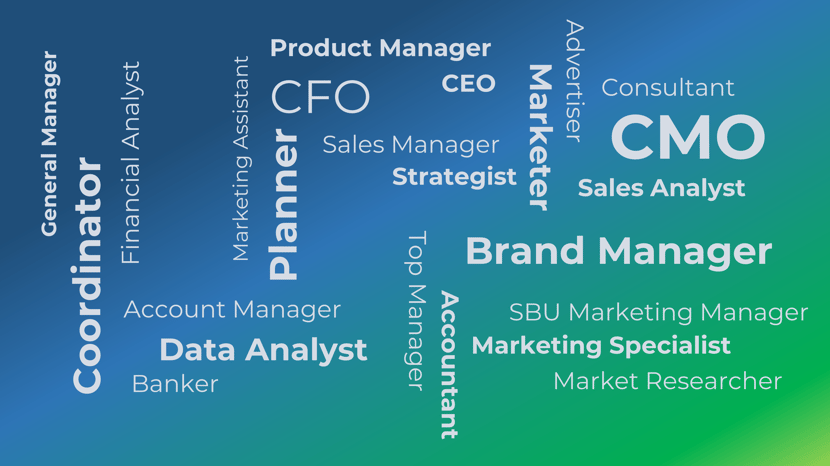Job Roles Simulations Prepare Students For According To Instructors
%20(LinkedIn%20Sponsored%20Content)%20(86)-min.png?width=800&name=Green%20and%20Black%20Live%20Podcast%20Guesting%20Instagram%20Post%20(600%20%C3%97%20250%20px)%20(LinkedIn%20Sponsored%20Content)%20(86)-min.png)
We recently surveyed over 100 instructors who use our business simulations in their courses. Our goal was to better understand what job roles our business simulations helped prepare students for after they graduated and moved onto the professional workforce.
The results revealed a wide range of possibilities, with one overlying similarity: business simulations set up students for success in the real world, no matter their job role.
The instructors we polled teach the following courses with our simulations:
-
- Level 6 & Level 7 Marketing
- Executive Education
- MBA
- Marketing Management (MBA)
- Capstone Marketing Course
- Marketing Strategy
- Marketing Innovation
- Innovation Strategy
- Marketing Management
- Consumer Behavior
- Integrated Practices
- New Product Development
- Business Courses
- Advertising
- Market Strategy
- Telecommunications
- International Marketing
- Financial Management
- International Business Finance & Investment
- Marketing Communications
List of the top job roles business simulations prepare students for

We asked our instructors what job roles correspond best with the learning outcomes of our simulations, based on what they’ve observed. Here are their answers:
-
- Product Manager
- Sales Manager
- Marketing manager
- Financial Analyst
- Brand Manager
- Account Manager
- Data Analyst
- Banker
- Consultant
- CEO
- CMO
- CFO
- Strategist
- Accountant
- Marketing Specialist
- Sales Analyst
- Planner
- Coordinator
- Banker
- Marketing Assistant
- Market researcher
- Advertising roles
- General management
- Brand manager assistant
- CMO assistant
- Marketing management
- Market analyst
- Marketers
- SBU Managers/ SBU Marketing Managers
- Top Manager
- Finance roles
Some instructors gave more details regarding the job roles they mentioned:
“StratX simulations help prepare students for any job role, but they are best for roles where lots of qualitative and quantitative information needs to be combined during decision making processes.”
“Simulations like Markstrat develop students into potential managers in any industry, at any company or in any country to understand how to analyse a marketplace, the impact of customer and competitor activity and on your company’s ability to respond to its environment.”
StratX Simulations prepare students for many roles, “all aspects of the 4Ps of Marketing along with aspects of accounting and finance.”
“Primarily it is a great training for Product & Brand Managers, Marketing Managers... the big picture ... but as there are nicely seen many interrelations in the business it is very useful too also for other functions outside of marketing.”
“Any job related to marketing, but we had students in the past getting into banking and finding this simulation very useful”
How do simulations prepare them for these roles?
In the survey, our instructors seemed to agree that since simulations do a good job at mimicking real life business scenarios, they are an effective tool for preparing students for the business world. The hands-on element “brings to life concepts and forces students to apply them in a real-world context”.
Applicable hard and soft skills
Survey results found that not only do simulations help develop hard skills like data analysis and financial acumen, they also build key soft skills like teamwork, time management and negotiations skills. This is because students must work together to make critical decisions under time pressure, so they must flex both their analytical and social muscles to come out strong.
Some insights from the survey:
“Students have the opportunity to make actual decisions and see the implications of their actions. They have to make sense of vast quantities of data and convert this into useful information.”
“The simulation provides good preparation in exposing participants to situations they will actually be facing in their future roles.”
More feedback on how simulations develop these skills from the survey:
-
- They allow students to interpret large amounts of data and turn it into actionable recommendations
- They establish a framework to analyze commercial issues
- They provide different levers that can be pulled to try to improve competitive performance
- Students are forced to manage a product portfolio, allocate resources, understand role of competition & financial consequences of their decisions.
- Students learn how to change/pivot in the face of dynamic markets.
The OODA loop
One instructor confirmed that when playing a simulation such as Markstrat, students repeatedly go through the OODA loop: Observation, Orientation, Decision and Action. This refers to the strategic advantage that a decision maker gets when he or she observes the situation and orients themselves and then decides and acts accordingly. This process allows students to make savvy decisions and learn from the consequences of their decisions, much like in the business world.
Preparation better than an internship
Another instructor mentioned that StratX Simulations take textbook learning to another level of comprehension and prepare students for the real world in a way that no other method provides.
“The simulation allows the students to actually apply the knowledge they have learned at university, explains correlations better than many textbooks and introduces them playfully to complex market processes that are not even seen in an internship.
The biggest learning is that the students see how much everything (markets, decisions, budget, R&D, etc.) is really connected and what can be achieved by making smart decisions and checking the data.”
Decision-making & thinking like a manager
The results from the survey show that many instructors believe the simulation is an effective way to replicate real decisions & thought processes that managers in any role must face, whether it be marketing, sales, or finance.
As one instructor puts it: “It simulates "day in the life" of a manager: reflecting value of data analytics, capturing relevant data, addressing budget and strategic investment decisions, and working effectively with others.
Another professor succinctly maps out the simulation learning outcomes as:
-
- Making sense of data
- Identifying priorities
- Planning a multi-stage strategy
- Balancing budget in a marketing mix
- Analyzing competitors’ strategies
- Understanding awareness – intention – availability – purchase
More “big-picture” insights from an instructor include:
-
- Better understanding for making decisions with strategic intent
- An appreciation for the importance of focusing on value creation outcomes
- Making data-based decisions for better results
- Basic understanding of causal relationship between marketing mix components and business outcomes
Simulations also “demonstrate the complexity of managing multiple goals simultaneously”, a very common challenge that managers face in their roles.
Customer-centric thinking
Since simulations are designed to focus developing products for specific segments, it sets students up for putting the customer at the heart of every business decision.
As one instructor explained “it gives the true marketing perspective, a holistic view of how to manage a customer-focused firm.”
Another instructor notes that our simulations provide a “holistic perspective on resource allocation and a deeper understanding of the customer buying processes”.
7 Simulations you can discover right now
At StratX Simulations, we develop realistic, action-based simulations that prepare students for the workforce. Through a competitive and engaging experience, students learn essential concepts in marketing strategy, digital, innovation and sales.
Find out which of our simulations will fit into your course:

%20(LinkedIn%20Sponsored%20Content)%20(88)-min.png?width=352&name=Green%20and%20Black%20Live%20Podcast%20Guesting%20Instagram%20Post%20(600%20%C3%97%20250%20px)%20(LinkedIn%20Sponsored%20Content)%20(88)-min.png)
%20(LinkedIn%20Sponsored%20Content)%20-%202022-07-06T145932.184-min.png?width=352&name=Green%20and%20Black%20Live%20Podcast%20Guesting%20Instagram%20Post%20(600%20%C3%97%20250%20px)%20(LinkedIn%20Sponsored%20Content)%20-%202022-07-06T145932.184-min.png)
